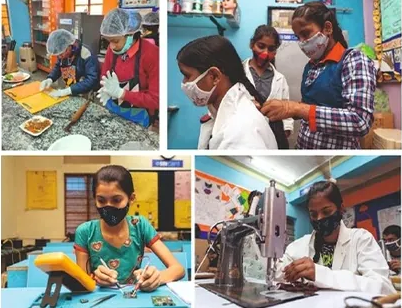Literacy India: The wind beneath their wings
Literacy India, in the last 25 years, has evolved in its reach and strategies to help young children to become contributing and responsible adults. The students educated under the Vidyapeeth School Project at Gurugram, have been trained to help themselves and also to take care of their families. Many students have now become Role Models for their communities and are living testimonies declaring the importance of education and skilling in life. It is inspiring for people in the community to see their young Vivek joining the F&B department of Fortune Select Global Hotel. Sundari, a bright girl, is now working as a Beauty & Wellness expert and runs her Beauty Saloon; Bheru Lal and Santosh Yadav own mobile training institute and mobile repair shop, respectively. Naddem started his career as Technical Support but now leads a Samsung Service Centre as Sr. Technical Executive.
Since 2006
Literacy India has been stressing on imparting pre–vocational education as a part of its everyday school curriculum. Such classes, offered at Literacy India, aim to enable future citizens of India to be self-equipped and self-reliant. During schooling students are offered a variety of courses, based on their interest, including mobile repairing, computer hardware, cooking, cutting & stitching and beautician courses. These courses envision to help students learn any practical practicality that could be useful in their day to day life, which a student could later develop into a full time vocation. At Vidyapeeth School it is mandatory to opt for one of these pre-vocational subjects that are included in the curriculum as per the educational guidelines issued by National Institute of Open Schooling.
PRE-VOCATIONAL TRAINING PROJECT SUPPORTS SDG 4 & SDG 8:
Promote sustained, inclusive and sustainable economic growth, full and productive employment and decent work for all.
Along with understanding the usefulness of vocational training, they also possess a strong understanding of combining technology and education thereby helping evolve a unique ‘blended learning model of vocational training’ that promises to make vocational training more accessible, affordable and effective.
The National Education Policy 2020 has strengthened the programmatic resolve of Literacy India, by stressing upon foundational literacy and numeracy with no rigid separation between academic streams, extracurricular, vocational streams in school education. In fact, it advocates Vocational Education to start from Class VI, making provisions for initiating internships to help students gain necessary skills required for industries later in their lives. As per the skill gap study conducted by the National Skill Development Cooperation (NSDC) over 2010-2014, it has pointed out an additional net incremental requirement of 109.73 million skilled man-powers by 2022 across twenty-four key sectors.
As India strengthens its base as a knowledge economy and embarking upon Industrial Revolution 4.0, there would naturally be additional requirements of highly skilled workforce in sectors like financial services, IT/ITeS, Biotechnology, Healthcare and Pharmaceuticals. Further, with value added industries being given a policy push under the ‘Make in India’ initiative, highly skilled workforce would also be required in high-end industries too.
For over two decades now Vocational Training has been an integral part of Literacy India’s academic syllabus much due to the paucity of educated and skilled workers in the community. Skill and knowledge being the driving forces of economic growth and social development should be integrated with education to make it practical and purposeful. Through the Vocational Training Programs, Literacy India aims to:
Create an aspirational value for practical skills among youth, by creating awareness on value of skill training.
Develop school facilities and addresses visible and invisible barriers to learning.
Provide platform to children who otherwise lack opportunities for studying in school.
To cultivate sustained interest in students to attend school and build on their overall motivation, confidence and positive energy.
To help children understand Career Choices and to provide exposure to these practical options.
The overall objective is to improve the Quality of Education and make it more hands-on, and facilitate the activity-based learning approach.
Ankush, 20 years, opted stitching and tailoring courses as his pre-vocational subject from Grade VIII and gradually completed advance level training in stitching. Presently, Ankush is a proficient tailor and feels happy with his steady income and financial contribution to his family. He wants to continue his work and open his own boutique in future.
A Class X pass-out, Taushid is now a Mobile Technician at Samsung Care in Gurgaon. As a Literacy India Vidyapeeth student he attended a mobile repairing course at the school. First joined a local shop near his residence but later on was selected by Samsung Care, Gurugram and now has a secure income to maintain his own bike and other hobbies along with making financial contributions in the family.
Literacy India’s programmatic association with its key donors like SBI-Card, SVP - Kolkata Chapter and Clifford Chance has helped provoke a positive impact in the lives of beneficiaries. Need is that more funders and donors should strengthen the resolve of such not-for-profit organisations like Literacy India that have established benchmarks in teaching and training the hungry “how to fish?” rather than “giving a free fish” to eat every time hunger strikes.
Published on Jan 18, 2022 05:12 PM IST, Hindustan Times
